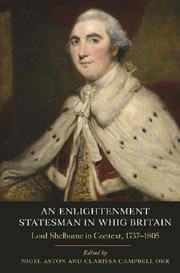Book contents
- Frontmatter
- Contents
- List of Illustrations
- List of Contributors
- Acknowledgements
- List of Abbreviations
- Introduction
- Part One Family, Piety, and Finance
- Part Two Politics
- 5 Shelburne: A Chathamite in Opposition and in Government 1760–82?
- 6 Shelburne and Ireland: Politician, Patriot, Absentee
- 7 Lord Shelburne's Ministry, 1782–3: ‘A Very Good List’
- 8 Shelburne, the European Powers, and the Peace of 1783
- Part Three The Bowood Circle Revisited
- Index
- STUDIES IN EARLY MODERN CULTURAL, POLITICAL AND SOCIAL HISTORY
8 - Shelburne, the European Powers, and the Peace of 1783
from Part Two - Politics
Published online by Cambridge University Press: 05 September 2013
- Frontmatter
- Contents
- List of Illustrations
- List of Contributors
- Acknowledgements
- List of Abbreviations
- Introduction
- Part One Family, Piety, and Finance
- Part Two Politics
- 5 Shelburne: A Chathamite in Opposition and in Government 1760–82?
- 6 Shelburne and Ireland: Politician, Patriot, Absentee
- 7 Lord Shelburne's Ministry, 1782–3: ‘A Very Good List’
- 8 Shelburne, the European Powers, and the Peace of 1783
- Part Three The Bowood Circle Revisited
- Index
- STUDIES IN EARLY MODERN CULTURAL, POLITICAL AND SOCIAL HISTORY
Summary
Writing to Charles Jenkinson on 13 November 1782, Lord Shelburne noted that:
Parliament and the Peace make Government a perfect Pandora's box.… It is impossible for me to say whether I can conduct our Barque without losing some masts and endangering others.… But I will do my best.
For making peace was complicated. At the start of 1782 Britain was still caught up in attempting to suppress the revolt of her American colonies. She was also at war with France, Spain, and the Netherlands. The War of American Independence involved armed conflict in the Channel, the Mediterranean, and the Atlantic, in Africa, India, America, and the Caribbean. The peace of 1783 had to deal with lands and territory in all four quarters of the world.
Until almost the end of the war, the British government had been unwilling to contemplate American independence. A series of military reverses and defeat at the battle of Yorktown spurred the House of Commons into renouncing offensive warfare in America in February 1782. Lord North, the minister who had presided over one of Britain's least successful wars, resigned before he was censured. The War of American Independence was not so much won by America as abandoned by Britain. The challenge for North's successors was to find an acceptable peace.
George III was forced to admit the opposition to power and the Marquess of Rockingham became first minister at the beginning of April 1782. The Rockingham ministry was, from its inception, an uneasy alliance of what had previously been the two major opposition groupings.
- Type
- Chapter
- Information
- An Enlightenment Statesman in Whig BritainLord Shelburne in Context, 1737–1805, pp. 177 - 194Publisher: Boydell & BrewerPrint publication year: 2011

